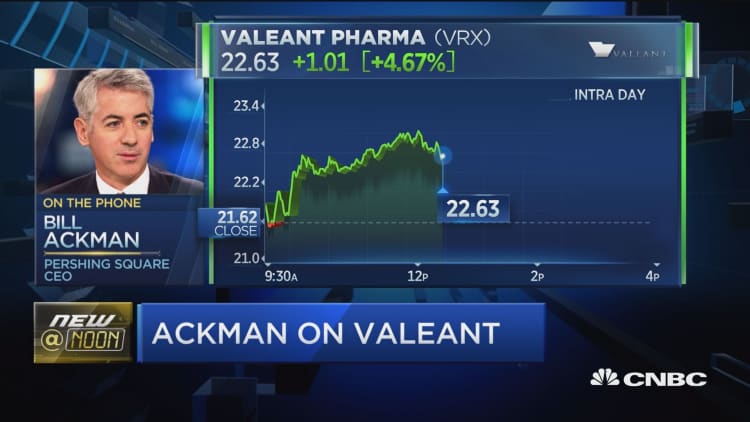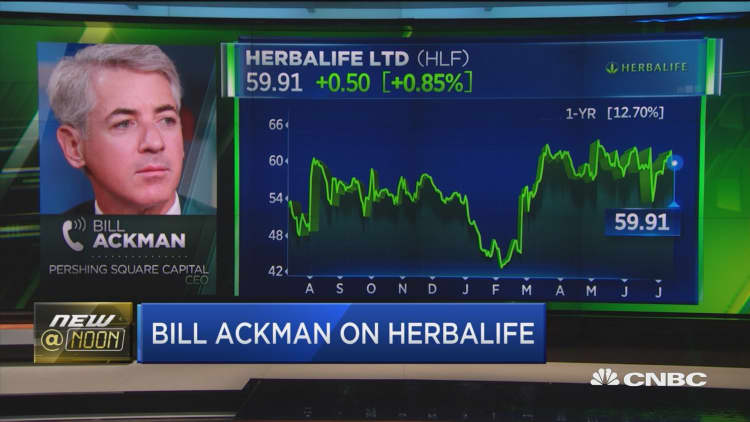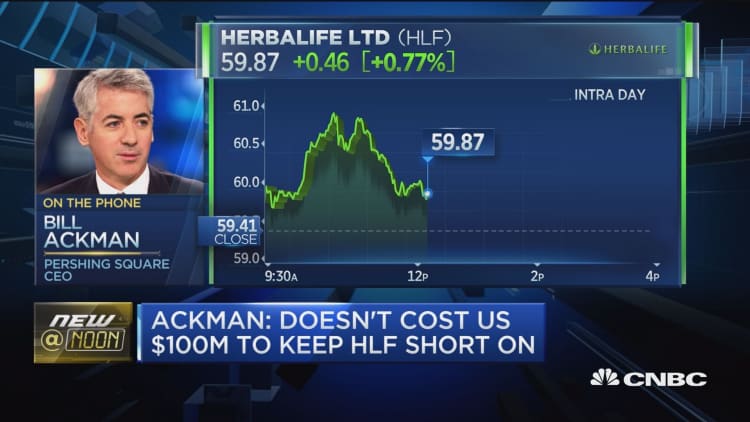


Valeant Pharmaceuticals has no plans to sell core assets like Bausch & Lomb, according to board member Bill Ackman.
He told CNBC's "Halftime Report" on Thursday that while it's likely there will come a day where the pharmaceutical company sells a lot of its non-core assets, Bausch & Lomb will not be one.
In fact, Ackman says it's possible that in the future, the brand could become "an even more dominant part of the franchise." He said Valeant may someday even rename itself Bausch & Lomb.
"Bausch & Lomb has a very low tax basis relative to what we believe it is worth. We think it's a great franchise. We think it's a franchise that you build on and it's really the core of the company," he said.
Ackman's hedge fund, Pershing Square Capital Management, has had a tough year, hit in particular by its stake in Valeant. Earlier this year, Ackman said that "of course" he regrets his initial investment in the embattled pharmaceutical company.
CNBC reported Wednesday that J. Michael Pearson, former CEO of Valeant Pharmaceuticals, unloaded more of his personal holdings than originally thought. The founder and CEO of Pershing Square said that "it's kind of sad that he was forced to sell out at this price."
U.S.-listed shares of Valeant traded near $22.40 on Thursday, a fraction of its all-time intraday high of $263.81.
According to documents not made public yet but obtained by CNBC, Pearson sold nearly 5 million shares and options for a total of $96.8 million. The news came on the same day that the Sequoia Fund revealed it is completely out of the stock. Sequoia was at one time the largest Valeant shareholder.
Also Wednesday, short seller Andrew Left said that Valeant's stock could be headed to zero, sinking share prices.
The Canadian drugmaker came under fire when The New York Times reported that Valeant and other pharmaceutical companies were using a network of specialty pharmacies to sustain sales of their high-priced drugs and prevent patients and insurers from switching to cheaper generic drugs. Citron Research subsequently published a note calling Valeant the "pharmaceutical Enron."
In response, Valeant formed an ad hoc committee to review the allegations regarding specialty pharmacy Philidor RX Services. The U.S. Securities and Exchange Commission is investigating the relationship between the two companies.
Ackman also said that he's still betting against Herbalife and that the company needs to makes "material changes to its incentive structure."
Recently, a number of videos highlighting that "false and misleading claims" made by the nutritional supplement marketer have been published on "Facts About Herbalife," a website maintained by Pershing Square.
When CNBC asked about why the firm is releasing so many videos about the company, Ackman joked that Pershing Square is "diversifying and going into the movie production business." The hedge fund manager said that regardless of the result, the FTC probe of Herbalife is unlikely to end well for the company because it's business model isn't built upon actual retail sales. Ackman has long called Herbalife a "pyramid scheme."
Ackman took a short position on the company more than three years ago. In May, he told CNBC that his bet against the company is roughly $1 billion. He also advised Herbalife employees to leave the company because it's "not going to be a good thing on your resume" and to "go find another job."
Ahead of Ackman's Thursday appearance, Herbalife told CNBC that "it has been three years and [Ackman] has lost hundreds of millions of dollars. He admitted in the Fortune piece that it as costing him more than 100 million a year in carrying cost. When is it time to just say he gave it a valiant try but like Borders, JC Penney, Target, he was just misinformed?"
— CNBC's Everett Rosenfeld, Jacob Pramuk and Patricia Martell contributed to this report.


